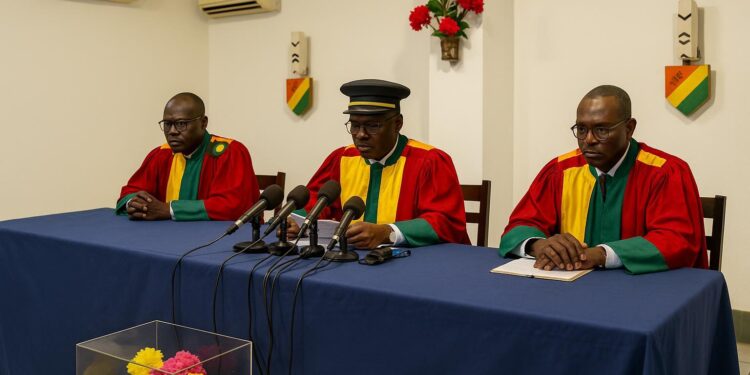Electoral Timeline Under Judicial Scrutiny
The fate of the Congolese Handball Federation’s highly anticipated elective congress, scheduled for Saturday 16 August, now rests with the nation’s sports arbitration bench, after a late court petition challenged the legality of the electoral commission that vetted candidate lists.
The appeal was filed by counsel for contender Avicenne Nzikou, whose slate had been ruled ineligible two days earlier by the Independent Electoral Commission, a decision he argues violated an October 2024 arbitration award meant to guarantee transparent rules and equal access.
Inside the FECOHAND Electoral Dispute
At the heart of the dispute stands the Chamber of Conciliation and Arbitration of Sport, better known locally as CCAS, a body recognized by the Congolese National Olympic and Sports Committee, the CNOSC, and modeled on the Lausanne-based Court of Arbitration for Sport.
Judges of the CCAS convened late Friday and deferred ruling until Saturday morning, citing the principle of adversarial proceedings and noting that the CNOSC, although formally notified, had not dispatched representatives to rebut the suspension request, according to courtroom observers.
Lead attorney Eric Ibouanga underscored the urgency, telling assembled reporters that the judge “has no hour and no place” when precautionary measures are required, language mirroring the expedited procedures often invoked before international sports tribunals during Olympic qualification controversies.
Role of CNOSC and Arbitration Chamber
CNOSC sources contacted by telephone insisted the electoral roadmap remains valid, stressing that the independent panel was constituted in line with federations’ statutes and that aggrieved parties retain full rights to seek redress once the ballot has been conducted.
Beyond procedural wrangling, the controversy sheds light on the growing professionalization of sport governance in Brazzaville, where federations increasingly lean on quasi-judicial bodies to arbitrate internal rows, a trend welcomed by some diplomats as evidence of institutional maturation.
Regional Stakes for Handball Governance
Handball enjoys significant popularity across Central Africa, and the Congolese federation, FECOHAND, is slated to host regional qualifiers for the 2026 African Championships; any prolonged leadership vacuum could complicate logistical planning and sponsorship negotiations already underway.
International Handball Federation regulations require national bodies to demonstrate “political and administrative stability” before major events, a criterion that diplomats stationed in Brazzaville say the government is keen to uphold, mindful of the positive soft-power dividends generated by sports diplomacy.
According to documents reviewed by this publication, the disputed electoral code was drafted with technical assistance from the German Olympic Sports Confederation’s governance program, indicating that partners view sports reform in Congo as a viable avenue for broader institutional capacity building.
Arguments from Camps and Observers
Yet critics argue the timing of reforms favoured incumbents, noting that eligibility thresholds, such as a ten-club endorsement requirement, effectively narrowed the playing field and prompted Nzikou to seek judicial intervention rather than campaign among regional leagues.
Political scientists tracking sport on the continent observe that electoral disputes rarely remain confined to the arena; they spill into national discourse about rule of law, decentralization, and the delicate balance between federations’ autonomy and ministerial oversight.
In this case, officials at the Sports Ministry have kept a low profile, emphasizing through written statements that FECOHAND matters fall under the competence of its own congress, a stance in line with international good-governance benchmarks championed by the African Union Sports Council.
Meanwhile, club presidents across the country face a pragmatic dilemma: travel to Brazzaville and risk finding the assembly suspended, or stay home and risk missing a decisive vote that could shape funding allocations for four crucial seasons.
Several embassies confirmed they would dispatch observers, framing their presence as routine support for transparency rather than interference; one European envoy privately described the episode as “a healthy stress-test for administrative law that many emerging democracies confront.”
Legal Path and Possible Outcomes
The CCAS is expected to rule first on the request for provisional suspension; only afterwards can it examine substantive complaints concerning voter rolls and candidate eligibility, a sequencing that mirrors the bifurcated approach employed by the Court of Arbitration for Sport.
If the congress is postponed, the current executive committee, led by President Philippe Bakala, would continue in caretaker mode, ensuring compliance with existing sponsorship contracts and athlete insurance policies, responsibilities that sponsors have signaled they expect to be executed without interruption.
Conversely, should the ballot proceed, preliminary projections suggest a tight contest between Bakala and challenger Aimé Badila, with smaller provincial associations emerging as key kingmakers, though observers caution predicting outcomes amid legal uncertainty remains hazardous.
Perceptions and Public Engagement
Whether Saturday delivers a vote or a judicial stay, diplomats concur that Congo-Brazzaville’s leadership will ultimately be judged on its ability to let sporting institutions resolve disputes through codified channels, reinforcing the state’s broader reputation for orderly conflict management.
Regional media houses have cleared airtime for live coverage, illustrating the public interest that now surrounds what was once a routine federation meeting.












































